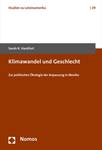Climate Change and Gender: On the Political Ecology of Adaptation in Mexico
Abstract
The study aims at a deeper analytical understanding of the complex constitutive conditions and the intersectional significance of gender for dealing with climate change. How does gender become significant for adaptability in dealing with climate change? What role do other structural inequalities, symbolic representations and identities play?
Based on socio-ecological research approaches and feminist approaches, a theoretical-conceptual framework for analysis is developed and a qualitative empirical case study is conducted in Mexico.
With its results, the study not only makes a well thought-out and innovative contribution to social science research on adaptation and vulnerability, but also provides fruitful impulses for inequality research in socio-ecological contexts and for critical feminist theorising.
Authors
Hackfort, Sarah K.
Source information
Title
Climate Change and Gender: On the Political Ecology of Adaptation in Mexico
Year of publication
2015
Publisher
Nomos - Baden-Baden
Document type
Book Monograph